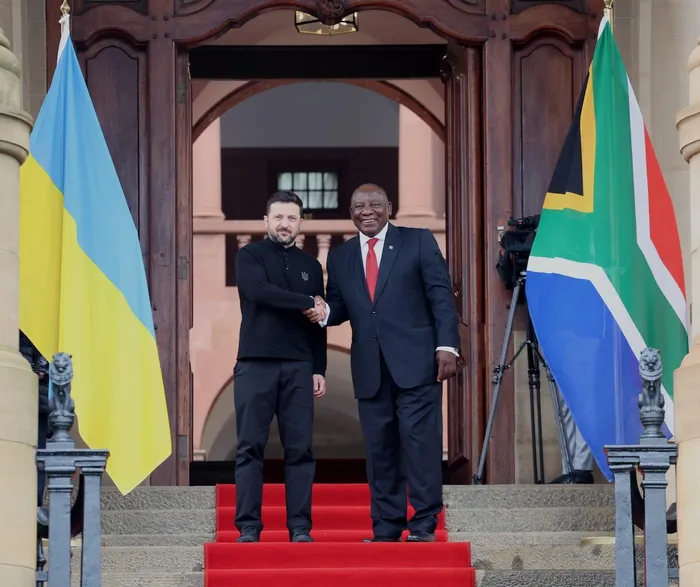SA's non-aligned status in critics crosshairs
RAMAPHOSA, ZELENSKYY MEETING

President Cyril Ramaphosa welcomes Ukraine President Volodymyr Zelenskyy at the Union Buildings in Pretoria on April 24, 2025.
Image: GCIS
Dr. Reneva Fourie
The scheduled visit of Ukrainian President Volodymyr Zelenskyy to South Africa this week was abruptly shortened following a devastating Russian attack on Kyiv. While presented as part of the African Peace Mission initiative and the country’s broader diplomatic engagements, the meeting came at a sensitive moment, defined by growing international calls for a negotiated end to the Russia-Ukraine conflict, even as certain Western powers appear determined to prolong the war.
Since the outbreak of hostilities in 2022, South Africa has charted a careful and principled course rooted in impartiality, multilateralism and consensus building. Unlike the polarised positions of many NATO-aligned countries, South Africa consistently withstood the pressure to adopt simplistic binaries in an undeniably complex geopolitical conflict. The country’s approach has been shaped by the foundational values of the Non-Aligned Movement –emphasising neutrality, peaceful resolution of disputes, and respect for diverse historical and political contexts.
In line with this stance, South Africa consistently abstained from all UN General Assembly resolutions relating to the Ukraine war. The actions were not an endorsement of aggression but a recognition that peace cannot be achieved through partisan posturing. It was also a statement against the selective application of international law, wherein sovereignty is upheld in Ukraine but conveniently disregarded in other regions facing Western interventions.
President Cyril Ramaphosa’s leadership further demonstrated South Africa’s commitment to meaningful diplomacy. In June 2023, he spearheaded an unprecedented peace mission to Kyiv and Moscow, joined by a delegation of African heads of state. It was the first instance of African leaders undertaking a peace initiative outside the continent. The mission conveyed that Africa, long sidelined in global conflict resolution, was prepared to offer a credible alternative to militarised stalemates.
Following the visit, South Africa remained engaged in quiet diplomacy. Ramaphosa continued direct discussions with Zelenskyy and Putin, focusing on tangible confidence-building measures. These included facilitating the release of prisoners of war and ensuring food security through uninterrupted grain exports. It further reiterated that the United Nations must play a central role in ending the conflict, insisting on a multilateral framework that promotes justice and sustainability over short-term political gain.
Given the ongoing violence and the growing toll of the war, the pressure to find a peaceful resolution between Russia and Ukraine is mounting. Zelenskyy’s inflexible position in the negotiations, as well as the timing and optics of the visit, risked sending the wrong signal. Some feared it might complicate delicate efforts to return both sides to the negotiating table. This is especially true given the Western media’s tendency to cast Ukraine in uncritical heroic terms while erasing the complex origins of the war.
South Africa’s critics of the visit pointed to the selective narrative surrounding Ukraine’s sovereignty. Western powers have invoked Ukraine’s territorial integrity with unflinching consistency.
Yet, those same voices were conspicuously silent during the 2014 Maidan coup, which saw the ousting of President Viktor Yanukovych. That event – widely acknowledged as being spearheaded by the United States and the United Kingdom – marked a rupture in Ukraine’s democratic order and triggered deep divisions within the country.
In its aftermath, the Donetsk and Luhansk regions held referenda overwhelmingly in favour of independence, results dismissed in the West but remaining a central factor in understanding the legitimacy crisis that followed. By failing to acknowledge this context, much of the Western narrative – and, by extension, Zelenskyy’s rhetoric – reduces a multifaceted conflict to a simple invasion story.
Adding to the controversy, domestic critics such as the South African Communist Party (SACP) publicly opposed Zelenskyy’s visit. They questioned his legitimacy as Ukraine’s leader, noting that his presidential term had lapsed without a new election, a fact largely overlooked by his Western backers. While President Putin recently secured re-election within Russia’s legal framework, Zelenskyy continued to hold office under emergency powers, raising concerns about democratic accountability.
The SACP also warned of the broader implications of hosting Zelenskyy. They cautioned that his visit could entangle South Africa in the geopolitical objectives of Western powers, who have used Ukraine as a proxy front in their competition with Russia. The SACP argued that this alignment risked drawing South Africa into an imperialist agenda that starkly contrasts its values of sovereignty, justice, and non-interference.
These warnings echoed the sentiments of several South Africans who feared that the country’s hard-won international credibility as a neutral mediator could be compromised. As chair of the G20, South Africa had taken a bold stance in advocating for inclusive negotiations and highlighting the devastating global impact of protracted conflicts, particularly on developing countries. The Johannesburg G20 foreign ministers’ meeting saw South Africa emphasise the need for economic development through peace and global cooperation. Aligning too closely with any single actor in the Ukraine conflict could jeopardise this carefully cultivated leadership role.
Ultimately, the question is not whether South Africa should engage with Ukraine – it should and has done so responsibly. The issue lies in how such engagement is perceived and whether it serves Pretoria’s vision of a multipolar, just world order. South Africa’s refusal to conform to Western narratives continues to be both a strength and a necessity. In this way, South Africa stands not only as a defender of its interests but also as a beacon for others, advocating for a world where all narratives are valued and heard.
* Dr Reneva Fourie is a policy analyst specialising in governance, development and security.